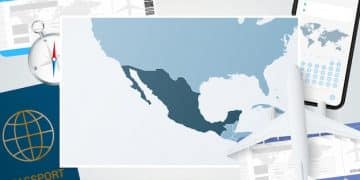2025 Naturalization Deadline: Are You Ready? Old Rules Alert

Prospective U.S. citizens from Mexico must understand the critical 2025 naturalization deadline looming for those seeking to apply under the current, potentially more favorable rules, necessitating immediate action to assess eligibility and gather documentation before possible legislative changes impact the process.
As the year 2025 rapidly approaches, a crucial deadline looms for many individuals hoping to become naturalized U.S. citizens, especially those from Mexico. The window to apply for naturalization under the “old rules” – which refers to the current immigration laws and policies as they stand – is potentially closing. This impending shift underscores the urgency for eligible individuals to assess their readiness and act decisively. Alert: The 2025 Deadline for Applying for Naturalization Under the Old Rules is Approaching – Are You Ready? This question is not merely rhetorical but a call to immediate, informed action for countless hopeful applicants across the United States.
Understanding the Impending Shift: What Are the “Old Rules”?
The phrase “old rules” in the context of naturalization applications doesn’t refer to a simple policy change but rather the existing framework of immigration laws and regulations that govern the naturalization process. This framework is subject to legislative shifts, executive actions, and judicial interpretations that can profoundly alter eligibility criteria, procedural requirements, and processing times. The looming 2025 deadline suggests that significant, potentially less favorable, changes may be on the horizon, making the current rules a more desirable pathway for many.
The Current Landscape of Naturalization
The naturalization process is a multi-step journey, requiring applicants to meet specific criteria, including continuous residency, good moral character, and a basic understanding of U.S. history and government. These requirements, while seemingly straightforward, are often complex in practice, involving detailed documentation and adherence to specific timelines. The current “old rules” encompass everything from form requirements to the duration of residency, and any proposed changes could significantly increase the burden on applicants.
Why the Urgency? Anticipated Legislative Changes
While no concrete “new rules” have been officially stipulated with a binding 2025 deadline, the immigration landscape in the United States is continuously evolving. Discussions around comprehensive immigration reform, changes to citizenship pathways, and stricter enforcement measures are perennial topics in legislative circles. The mention of a 2025 deadline often refers to the anticipated passage of new laws or significant regulatory amendments that could make naturalization more challenging. These changes might include:
- Increased residency requirements.
- More stringent good moral character evaluations.
- Higher application fees.
- Changes to English and civics test requirements.
These potential shifts create a sense of urgency for those who currently qualify, as they might find themselves ineligible or facing a more arduous process under future regulations. Therefore, applying under the existing rules, which are generally familiar and have established precedents, is a strategic move for many.
The existing rules, refined over decades, provide a clear, albeit rigorous, path to citizenship. For individuals from Mexico, who represent one of the largest groups of naturalization applicants, understanding these nuances is especially critical. The current framework offers a degree of predictability that proposed new laws might disrupt, potentially adding new complexities.
Eligibility Criteria: Are You on the Right Track?
Navigating the path to U.S. citizenship involves meeting stringent eligibility requirements set forth by U.S. Citizenship and Immigration Services (USCIS). Before even considering the looming 2025 deadline, it’s paramount to ascertain whether you meet the foundational criteria under the current “old rules.” This involves a thorough self-assessment of your immigration status, residency, and personal conduct.
General Requirements for Naturalization
The general requirements for naturalization are fairly consistent, but each has specific nuances that can impact eligibility. Typically, an applicant must:
- Be at least 18 years old at the time of filing Form N-400, Application for Naturalization.
- Be a lawful permanent resident (Green Card holder) for at least 5 years (or 3 years if married to a U.S. citizen and living in marital union with the U.S. citizen spouse).
- Have continuously resided in the U.S. for at least half of the required residency period.
- Be able to read, write, and speak basic English.
- Have a basic understanding of U.S. history and government (civics).
- Be a person of good moral character.
- Be willing to take an Oath of Allegiance to the United States.
Each of these points has specific definitions and exceptions. For instance, “continuous residency” is not the same as “physical presence,” and certain absences from the U.S. can break continuous residency, even if physical presence requirements are met.
Residency Requirements Detailed
The continuous residency requirement is often a stumbling block for many applicants. It means maintaining your status as a lawful permanent resident for the specified period leading up to your naturalization application. While you don’t need to be physically present every day, extended stays outside the U.S. can disrupt this continuity.
Impact of Absences
If an absence from the U.S. is six months or more but less than one year, it creates a presumption that continuous residency has been broken. This presumption can be overcome with evidence showing you did not abandon your residency. An absence of one year or more automatically breaks continuous residency unless you obtained an approved Form N-470, Application to Preserve Residence for Naturalization Purposes, before leaving the U.S. Understanding these nuances is crucial, particularly for individuals who frequently travel due to work or family obligations.
Good Moral Character Assessment
The “good moral character” requirement is perhaps the most subjective and often leads to complexities. USCIS officers evaluate an applicant’s conduct during the statutory period (typically the 5 or 3 years prior to filing) to determine if they meet this standard. Certain acts, such as specific crimes (even minor ones), false statements to government officials, or failure to pay taxes or child support, can be detrimental. It is important to disclose all relevant information, even if it seems minor, as any undisclosed issue can lead to a denial. For those with a complex history, consulting an immigration attorney is highly advisable. This meticulous adherence to legal and ethical standards reinforces the integrity of the naturalization process.

The Application Process: Step-by-Step for Timely Submission
The naturalization application process, while seemingly straightforward, demands meticulous attention to detail and adherence to specific steps. To meet the potential 2025 deadline under the current rules, a timely and accurate submission is paramount. Skipping a step or making an error can lead to delays or even a denial, necessitating resubmission and prolonged waiting periods.
Gathering Essential Documents
Before filling out Form N-400, Application for Naturalization, the first critical step is to gather all necessary supporting documents. This phase often takes the longest, as some documents may need to be ordered or translated.
Key Documents Required:
- Your Permanent Resident Card (Green Card).
- All passports, current and expired.
- Birth certificate (if applicable).
- Marriage certificate (if relying on a U.S. citizen spouse’s eligibility).
- Divorce decrees or death certificates (if applicable).
- Proof of selective service registration (for male applicants aged 18-26).
- Tax transcripts for the past five years (or three years if married to a U.S. citizen).
- Records of arrests, citations, or detentions, even if charges were dropped or expunged.
- Children’s birth certificates (if applicable).
Ensure all foreign language documents are accompanied by a certified English translation. Incomplete documentation is a leading cause of application delays.
Completing Form N-400 Accurately
Form N-400 is the core of your naturalization application. It is lengthy and requires precise information about your personal history, residency, employment, travel, and moral character.
Tips for Accurate Completion:
- Read all instructions thoroughly before beginning.
- Answer all questions truthfully and completely.
- If a question does not apply, write “N/A” (Not Applicable) unless otherwise instructed.
- Use a black ink pen if filling out by hand, or type the information.
- Review your answers carefully for any typographical errors.
Any discrepancies between your N-400 and supporting documents could raise red flags and lead to requests for evidence or an interview focusing on those inconsistencies.
Filing the Application and Biometrics
Once Form N-400 is complete and all supporting documents are compiled, the application, along with the correct filing fee, must be submitted to USCIS. There are specific mailing addresses depending on the state of residence and type of mailing service.
After submission, USCIS will send a receipt notice (Form I-797C, Notice of Action) confirming they received your application. The next step is usually a biometrics appointment, where your fingerprints, photograph, and signature are captured. These are used for background checks by the FBI. Failing to attend this appointment will result in delays or potential denial.
The Interview and Oath Ceremony
Following biometrics and background checks, eligible applicants will be scheduled for a naturalization interview. During this interview, a USCIS officer will review your N-400 application, ask questions about your eligibility, test your English proficiency (reading, writing, and speaking), and administer the civics test.
If the interview is successful, and all requirements are met, USCIS will schedule an Oath of Allegiance ceremony. This is the final step in the naturalization process, where you formally pledge your allegiance to the United States and become a U.S. citizen. Attending this ceremony is mandatory to complete the naturalization process. Adhering to each of these steps diligently improves the chances of a smooth and timely approval.
Potential Roadblocks and How to Overcome Them
The naturalization journey, while transformative, is not without its challenges. Applicants often encounter various roadblocks that can delay or even jeopardize their applications. Understanding these common issues and proactively addressing them is crucial for a successful and timely submission before the 2025 deadline.
Common Application Errors
Many denials or delays stem from preventable errors made during the application process. These can range from minor mistakes to significant omissions.
Frequent Mistakes:
- Incomplete Forms: Missing signatures, unanswered questions, or not attaching required photos.
- Insufficient Supporting Documentation: Failing to submit all necessary evidence, such as tax records, marriage certificates, or police reports.
- Incorrect Fees: Submitting the wrong filing fee or forgetting to include it entirely.
- Typographical Errors: Minor spelling mistakes or incorrect dates that can lead to inconsistencies.
To overcome these, always double-check your application, use the most current version of Form N-400, and ensure all supporting documents are clearly labeled and organized. Consider using a checklist provided by USCIS or an immigration attorney.
Dealing with Criminal Records or Immigration Violations
A criminal record or past immigration violation is one of the most significant hurdles to naturalization. USCIS places a strong emphasis on “good moral character,” and certain offenses can render an applicant ineligible.
Strategies for Addressing These Issues:
- Full Disclosure: Always disclose all arrests, charges, or convictions, even if they were dismissed, expunged, or occurred long ago. Failure to disclose can be considered a lie and lead to a denial for lack of good moral character.
- Certified Dispositions: Obtain certified court dispositions for all incidents. This documentation is crucial to demonstrate the outcome of legal proceedings.
- Legal Counsel: For any criminal history or immigration violation, even seemingly minor ones, it is highly advisable to consult with an immigration attorney. They can assess the impact on your eligibility, guide you through the process of obtaining necessary documents, and represent you if waivers or special considerations are needed.
Some offenses may have specific bars to naturalization, while others may require a longer period of good moral character to be established.
Language and Civics Test Challenges
The English and civics components are mandatory elements of the naturalization interview, designed to ensure applicants possess a basic understanding of U.S. principles.
Tips for Preparation:
- English Proficiency: Practice speaking, reading, and writing English regularly. Utilize online resources, adult education classes, or community programs designed for English language learners. The interview will include a simple conversation, reading simple sentences, and writing simple sentences in English.
- Civics Test: Study the official USCIS civics test questions and answers. There are 100 questions, and during the interview, the officer will ask up to 10 questions, requiring 6 correct answers to pass. Many free study guides and flashcards are available online.
- Exemptions: Be aware of potential exemptions from the English test (age and length of permanent residency) and the civics test (medical disability). If you believe you qualify for an exemption, ensure you have the necessary documentation (Form N-648, Medical Certification for Disability Exceptions) from a certified medical professional.
Proactive and consistent preparation for these tests significantly increases the likelihood of a successful interview.
The Role of Mexican Immigration in Naturalization
Mexican immigrants constitute one of the largest and most significant groups of foreign-born individuals in the United States, and consequently, a substantial portion of naturalization applicants. Their unique demographic and socio-economic characteristics often influence their naturalization pathways, highlighting specific considerations and challenges within the broader immigration framework.
Demographics and Trends
Mexicans have historically been the largest immigrant group in the U.S., with millions residing across various states. This demographic reality means that any changes to naturalization policies, including the potential 2025 deadline, disproportionately affect this community.
Key Trends:
- Long-Term Residency: A significant portion of Mexican immigrants have lived in the U.S. for extended periods, many having established lawful permanent residency decades ago. This often makes them eligible for naturalization under existing rules.
- Family-Based Immigration: Family reunification has been a primary pathway for Mexican immigrants to obtain lawful permanent residency, subsequently making them eligible for naturalization once the requisite time period has passed.
- Geographic Concentration: Mexican immigrants are often concentrated in specific states (e.g., California, Texas, Arizona, Illinois). This concentration means local immigration services and non-profit organizations play a vital role in assisting with naturalization applications.
Understanding these trends helps in tailoring outreach and support efforts to ensure this community is well-informed about critical deadlines.
Unique Challenges Faced by Mexican Applicants
While the general naturalization requirements apply to all, Mexican applicants may face specific hurdles rooted in historical contexts, socio-economic factors, and cross-border dynamics.
Specific Challenges:
- Documentation: Obtaining necessary personal documents from Mexico, such as birth certificates, marriage licenses, or police records, can sometimes be challenging due to bureaucracy or logistical issues in the home country.
- Language Barriers: Despite the English test requirement, some applicants, particularly older generations or those with limited educational opportunities, may struggle with English proficiency, requiring dedicated language support.
- Fear of Deportation: Despite being lawful permanent residents, a lingering fear of deportation, often fueled by personal experiences or community narratives, can sometimes deter eligible individuals from applying for naturalization.
- Economic Constraints: The cost of the naturalization application fee (currently over $700) can be a significant barrier for low-income families, even with fee waiver options available.
These challenges underscore the need for targeted support systems and accessible information for the Mexican immigrant community.
Resources and Support Networks
Fortunately, numerous resources and support networks exist to assist Mexican immigrants, and indeed all eligible green card holders, in their naturalization journey.
Available Support:
- Non-Profit Organizations: Many community-based non-profits offer free or low-cost legal assistance, application workshops, and English/civics classes. Organizations like NALEO Educational Fund, Immigrant Legal Resource Center (ILRC), and local community centers often provide crucial services.
- USCIS Resources: The official USCIS website provides comprehensive guides, free study materials for the civics test, and detailed instructions for Form N-400.
- Legal Aid: For complex cases involving criminal records or eligibility issues, legal aid societies and pro bono attorneys offer invaluable assistance.
Leveraging these resources can significantly alleviate the burden of the application process and increase the likelihood of meeting the 2025 deadline.
Proactive Steps for a Smoother Naturalization Journey
Given the potential 2025 deadline and the complexities of the naturalization process, adopting a proactive approach is not just advisable; it’s essential. Waiting until the last minute can lead to rushed applications, errors, and missed opportunities. By planning ahead, applicants can streamline their journey to U.S. citizenship.
Start Early: The Undeniable Advantage
The single most effective proactive step is to start the process well in advance of any perceived deadline. This involves initiating preparations even before you are technically eligible to file.
Benefits of Early Preparation:
- Adequate Documentation Gathering: Some documents can take weeks or months to obtain, especially if they are from a foreign country. Starting early allows ample time for this process without stress.
- Comprehensive Research: You can thoroughly research all requirements, potential exemptions, and any specific nuances related to your situation.
- Financial Planning: The application fees can be substantial. Early planning allows you to save money or explore fee waiver options without financial strain.
- Study Time for Tests: Ample time for English and civics test preparation can significantly ease anxiety and improve performance.
Even if the 2025 deadline proves to be flexible or moves, commencing preparations now ensures you are well-positioned for whatever changes may come.
Consulting with Legal Experts
While many aspects of the naturalization process can be navigated independently, consulting with an experienced immigration attorney can provide invaluable guidance, especially for complex cases.
When to Seek Legal Counsel:
- Criminal History: Even minor infractions should be reviewed by an attorney.
- Extended Absences: If you have spent significant time outside the U.S., an attorney can help assess continuous residency.
- Previous Denials: If a past application was denied, an attorney can help understand the reasons and strategize for reapplication.
- Disability Exemptions: For those seeking medical exemptions, an attorney can guide on proper documentation.
- General Uncertainty: If any aspect of your eligibility or the application process seems unclear, a legal consultation can provide clarity and peace of mind.
An attorney can also help prepare you for the interview, ensuring you are confident and well-versed in what to expect.
Staying Informed on Policy Changes
The immigration landscape is constantly shifting. Staying current with policy changes, legislative proposals, and USCIS updates is critical, particularly with an anticipated deadline on the horizon.
How to Stay Informed:
- Official USCIS Website: Regularly check the USCIS website for news alerts, policy manual updates, and changes to forms or fees.
- Reputable News Sources: Follow established news outlets that cover immigration policy, avoiding sensationalism.
- Immigration Advocacy Groups: Organizations dedicated to immigrant rights often provide timely analyses of policy changes and their potential impact.
- Legal Alerts: Many immigration law firms offer newsletters or blog posts that dissect new regulations and deadlines.
In a dynamic policy environment, being proactive in gathering information ensures that you make informed decisions and adapt your strategy as needed. This continuous engagement with information reinforces a readiness to respond effectively to legal developments.
Life After Naturalization: Rights and Responsibilities
Becoming a naturalized U.S. citizen is a profound transformation, opening doors to new rights and responsibilities. While the journey to citizenship can be arduous, the benefits of naturalization are substantial, fundamentally changing an individual’s relationship with their adopted country. This final step solidifies one’s place within American society, granting privileges and obligations that extend beyond those of a lawful permanent resident.
Unlocking New Rights and Opportunities
Naturalization confers a suite of enhanced rights and opportunities that are not available to green card holders. These benefits are often the primary motivation for many individuals pursuing citizenship.
Key Rights and Opportunities:
- Voting Rights: Naturalized citizens can vote in federal, state, and local elections, participating fully in the democratic process and influencing the direction of their communities and country.
- Sponsorship of Relatives: U.S. citizens generally have more favorable pathways to petition for family members to immigrate to the United States, including immediate relatives (spouses, unmarried children under 21, and parents) who are not subject to visa quotas.
- Eligibility for Federal Employment: Many federal jobs are restricted to U.S. citizens, particularly those requiring security clearances. Naturalization opens up these career opportunities.
- Protection from Deportation: Once naturalized, individuals are generally protected from deportation, even if they commit certain crimes that would make a permanent resident deportable. This offers a significant layer of security and peace of mind.
- U.S. Passport: Citizens can obtain a U.S. passport, facilitating international travel and providing consular protection abroad.
- Running for Public Office: Naturalized citizens can run for most public offices, with the exception of the U.S. presidency.
These rights empower new citizens to integrate more deeply into the civic, economic, and social fabric of the United States.
Embracing Civic Responsibilities
Along with new rights come new responsibilities. Citizenship is a two-way street, requiring active participation and adherence to the laws and civic duties of the nation.
Core Responsibilities:
- Obeying Laws: U.S. citizens are expected to understand and abide by federal, state, and local laws.
- Paying Taxes: Citizens have a responsibility to honestly pay their taxes to support government services.
- Serving on a Jury: Citizens are eligible and expected to serve on juries when called, participating in the justice system.
- Defending the Country: While not a daily obligation, male citizens aged 18-25 must register with the Selective Service. In times of national need, citizens may be called upon to defend the country.
- Participating in Civic Life: Beyond voting, this includes staying informed about current events, engaging in public discourse, and volunteering in community activities.
By embracing these responsibilities, naturalized citizens contribute positively to the strength and vitality of American democracy. Their unique perspectives and experiences enrich the national dialogue and foster a more inclusive society. The transition from permanent resident to citizen is not just a change in legal status, but a commitment to an active role in shaping the nation’s future.
| Key Point | Brief Description |
|---|---|
| 📅 Potential 2025 Deadline | Urgency to apply under current “old rules” due to anticipated legislative changes that might make naturalization harder. |
| ✅ Eligibility Assessment | Confirm continuous residency, good moral character, English/civics proficiency, and other requirements before applying. |
| 📝 Meticulous Application | Gather all documents, accurately complete Form N-400, and prepare for biometrics, interview, and oath ceremony. |
| 🤝 Seek Expert Help | Consult immigration attorneys for complex cases (e.g., criminal records) or general guidance to avoid pitfalls. |
Frequently Asked Questions
▼
The “old rules” refer to the current immigration laws and policies governing the U.S. naturalization process as they stand today. This term is used to contrast with potential future legislative changes or reforms that might make the process more difficult, expensive, or alter eligibility criteria. Applying under these rules ensures you’re assessed by known standards.
▼
The 2025 deadline is a widely discussed timeframe for potential significant changes in immigration law. For individuals from Mexico, who form a substantial portion of U.S. lawful permanent residents, these changes could directly impact their eligibility or increase the complexity and cost of their naturalization applications. Acting now under current rules is crucial.
▼
Key documents include your Permanent Resident Card, all passports (current and expired), certified copies of any court or arrest records, tax transcripts for the past five years, and evidence of continuous residency. If applicable, also include marriage certificates, divorce decrees, and birth certificates for dependents. Complete and accurate documentation prevents delays.
▼
Having a criminal record doesn’t automatically disqualify you, but full disclosure and legal counsel are essential. Certain crimes can impact “good moral character” requirements. It’s crucial to obtain certified court dispositions for all incidents and consult an experienced immigration attorney to assess your eligibility and navigate potential waivers or specific legal pathways.
▼
Naturalizing before potential rule changes ensures you apply under familiar criteria, potentially avoiding increased fees, stricter residency or eligibility requirements, or more complex procedures. Post-naturalization benefits include voting rights, enhanced family sponsorship options, wider federal employment opportunities, and protection from deportation, providing greater stability and civic engagement.

Conclusion
The discussion surrounding a potential 2025 deadline for applying for naturalization under the current “old rules” serves as a critical call to action for thousands of lawful permanent residents, particularly those within the Mexican immigrant community. While the exact scope and certainty of new, potentially more restrictive, regulations remain to be seen, the wisdom of acting proactively cannot be overstated. By thoroughly understanding the existing eligibility criteria, meticulously preparing and submitting applications, and addressing any potential roadblocks with informed strategies, applicants can navigate this complex process successfully. Naturalization offers not only heightened rights and opportunities within the United States but also provides a profound sense of security and belonging. Consequently, now is the opportune moment for all eligible individuals to assess their readiness and commence their journey towards U.S. citizenship, ensuring they secure their future under the most favorable conditions currently available.





